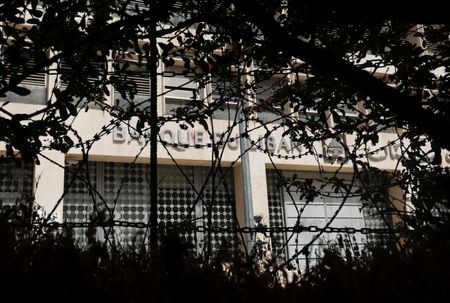(This story has been refiled to fix a typo in paragraph 11.)
By David Gauthier-Villars
(Reuters) – French prosecutors said on Monday they have put a Ukrainian woman linked to the governor of Lebanon’s central bank under formal investigation as part of a cross-border probe into alleged fraud to the detriment of the Lebanese state.
Anna Kosakova, with whom central bank governor Riad Salameh has a daughter, according to a birth certificate seen by Reuters, is suspected of aggravated money laundering, a spokesperson at the Paris office of the National Financial Prosecutors said.
Kosakova, who was notified about the preliminary charges on June 14, had to hand over her passport and was ordered not to leave France, the spokesperson said, confirming a report by French online journal Mediapart.
A lawyer for Kosakova said he and his client would “react very soon” to the French prosecutors’ decisions.
Salameh, who has not been named as a suspect by French prosecutors but who had some of his real estate assets in France seized as part of the investigation, did not respond to a message seeking comment.
A French lawyer for Salameh, Pierre-Olivier Sur, said the June decision on Kosakova “doesn’t change anything”. He said they were waiting for a French court to hear their challenge of the property seizures.
The French investigation is part of coordinated efforts by prosecutors in Lebanon, as well as in Switzerland, Germany, Luxembourg and Lichtenstein to determine whether Salameh used his position at the central bank, known as Banque du Liban (BDL), to embezzle hundreds of millions of dollars in public funds.
Swiss authorities suspect Salameh, together with a brother, Raja Salameh, may have illegally taken more than $300 million from BDL between 2002 and 2015, laundering some of the money in Switzerland, according to Swiss court documents seen by Reuters.
In an interview with Reuters in November last year, Riad Salameh denied any wrongdoing, saying no BDL or public Lebanese funds were diverted. A person close to Raja Salameh declined to comment.
In Germany, prosecutors have said they were investigating the possibility that some of the funds identified by Swiss authorities were used to acquire real estate assets, notably in Munich.
For their part, French prosecutors are trying to determine whether the Salameh brothers used some of those funds to acquire real estate in France, including part of a building on the Champs Elysees, according to people familiar with the investigation.
In the interview with Reuters, Riad Salameh has said he bought real estate assets with his own money, earned when he worked as an investment banker. Questioned by French investigators last year about the acquisitions, Raja Salameh denied any wrongdoing.
The Champs Elysees building has caught the attention of prosecutors in France as well as in Lebanon because, according to company records and lease contracts seen by Reuters, it houses a business center managed by Kosakova, part of which was rented by the Lebanese central bank.
(This story has been refiled to fix a typo in paragraph 11.)
(Reporting by David Gauthier-Villars; Editing by Angus MacSwan)

